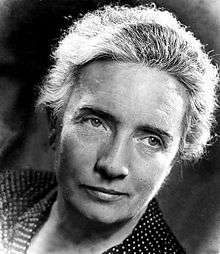Anna Kéthly

Anna Kéthly (16 November 1889 – 7 September 1976) was a Hungarian social democratic politician.
| Social democracy |
|---|
 |
|
Development |
|
People
|
|
Early career
She was one of nine children born into a poor family in Budapest, Hungary. At the age of fifteen she started working in a garment factory but soon found more appealing work in the editorial office of a women's magazine and this gave her the chance to further her education. In 1917, she joined the Hungarian Social Democratic Party and became an active Party member. In 1919, Kéthly was elected onto a committee of the Party. In subsequent years she was a frequent contributor to the Party's newspaper Népszava. In 1922 Kéthly was elected to Parliament as a member of the Social Democratic Party, and represented her Party in parliament without a break until the German invasion of Hungary in March 1944. After the German invasion, Kéthly left Budapest and lived in the country with false papers under an assumed identity.
After the Second World War, Kéthly again became politically active and helped to reorganize the Hungarian Social Democratic Party and she was elected to the Party's Political Committee. In April 1945, she was elected a member of the Provisional National Assembly and in the general elections in November of same year, she was re-elected to parliament, this time as head of the Social Democratic faction, and was made Deputy Speaker of Parliament. Kéthly made frequent contributions of articles to Socialist papers and was active in maintaining contact with international socialist Parties in the West. In post-war Hungary, she was a leading opponent of her Party's merger with the Hungarian Communist Party and in the internal power-struggle that ensued, in March 1948, she was dismissed from the Party and soon after she also lost her seat in Parliament and placed under house arrest for two years.
Arrest
In June 1950, Kéthly, together with several other members of the Social Democratic Party, was arrested by the Communists, who had in the meantime gained control of Hungary. In January 1954, after more than three years in prison, she was charged with spying and activities directed against the state and sentenced to life imprisonment. Following international pressure from Western socialist parties she was granted a pardon and released, but kept under permanent 'observation'.
Role in the Hungarian Revolution of 1956. Life in exile
On October 31, 1956, following the revival of the Hungarian Social Democratic Party during the Revolution, she became president of the Party. On November 1, she attended the Socialist International Meeting in Vienna, Austria. The following day, November 2, The Hungarian Government appointed her a delegate to the United Nations General Assembly. On November 3, her Party nominated Kéthly for a ministerial position in the new coalition government of Imre Nagy but at dawn the following day, November 4, 1956, the Soviet Union invaded Hungary and she was advised to fly to New York City and appeal to the U.N. General Assembly on behalf of Hungary. Eventually she settled in London, United Kingdom, where she carried on writing and editing Socialist publications. In 1962 the Hungarian Supreme Court reviewed Kéthly's 1954 pardon and, in absentia, imposed on her a three-year prison sentence for anti-state activities.
Anna Kéthly died on September 7, 1976, in Blankenberge, Belgium.
In October, 1990, her ashes were returned to Hungary and laid to rest. A full rehabilitation of Anna Kéthly took place on July 7, 1994, when the Hungarian Supreme Court annulled the 1962 verdict against her.
Movie
A movie about her life, Utolsó jelentés Annáról ("Last Report About Anna") premiered in late 2009. It was directed by Márta Mészáros. Enikő Eszenyi plays Kéthly.
External links
- United Nations Report of the Special Committee on the Problem of Hungary, General Assembly, Official Records, 11th session, Supplement No. 18 A/3592), New York. 1957
- Anna Kéthly Foundation
- Official website of theSocial Democratic Party (Hungary) (Kéthly's party)
- Official website of the Hungarian Social Democratic Party (a split of Kéthly's party which claims her legacy)